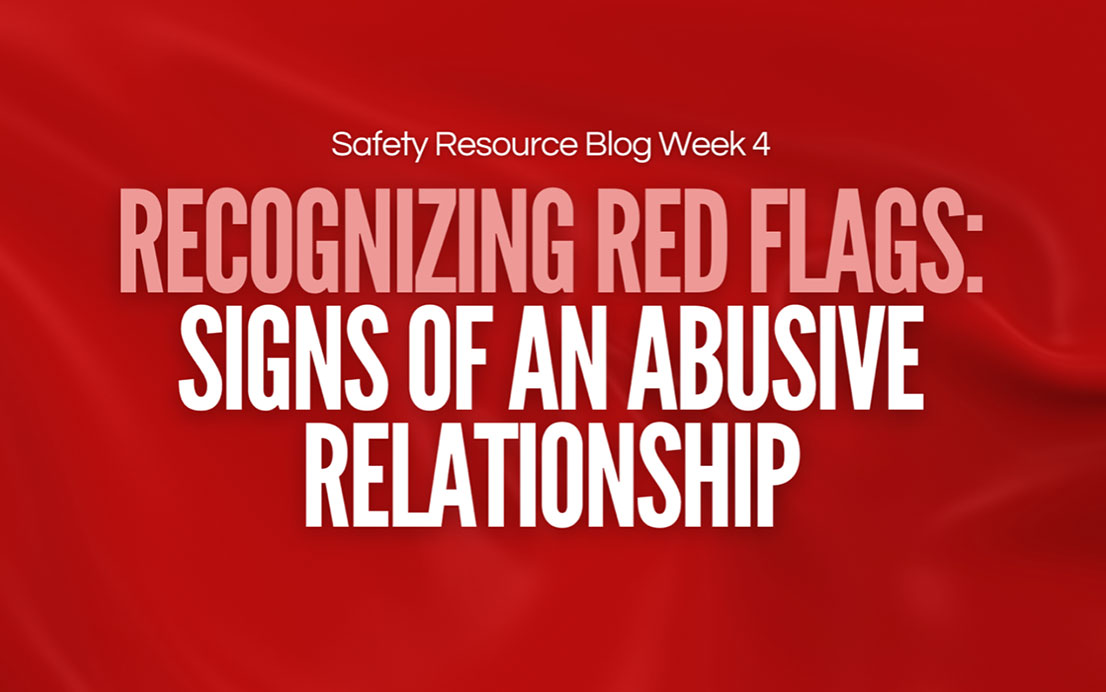
Recognizing Red Flags: Signs of an Abusive Relationship
Safety Resource Blog Week Four
Last week’s resource, we discussed the differences between a toxic relationship and an abusive relationship.
So, in this resource, let’s dive into the everyday warning signs of abuse and gain some understanding of tackling problems before they escalate further and potentially cause more harm.
Have you ever stopped to assess the health of your relationship or suspected that someone close to you might be involved in an unhealthy situation?
Spotting the signs of an abusive relationship can indeed be challenging, but they serve as indicators of a potential abusive relationship.
It’s crucial for maintaining a healthy dynamic and fostering a positive environment in your relationship. The people closest to us hold significant influence over our joy and mental well-being, so it’s vital to be vigilant in looking for these signs.
Understanding Toxic and Abusive Relationships
On the journey to weaving those meaningful connections, we often encounter relationships that are labeled as “toxic.” This term is commonly used across various facets of our lives, whether it’s within platonic friendships, family dynamics, workplace environments, or intimate partnerships.
Toxic relationships encompass a multitude of negative behaviours, including constant criticism, communication breakdowns, and emotional manipulation, which collectively foster an unhealthy atmosphere.
Abusive relationships entail a more severe escalation, manifesting in various forms such as physical or emotional harm, sexual abuse, control, and manipulation, ultimately creating a heightened sense of danger. However, both types of environments can be unsafe, hostile, and challenging to navigate.
It’s crucial to note that toxic relationships have the potential to escalate into abusive relationships. Recognizing the warning signs early on can help prevent further harm.
Identifying Red Flags
Understanding the signs of a toxic relationship may be the beginning to the journey of tackling the deeper issues at play. Realizing that an unhealthy connection might just escalate into abuse is an important awareness. Staying alert to those sly hints of trouble becomes key in navigating these intricate dynamics and finding your way to safety.
Now, let’s take a closer look on some behaviour’s worth keeping an eye out for.
Lack of Trust
- Suspicion, jealousy, and unfounded accusations.
- Difficulty believing or relying on the partner.
- Erosion of trust leading to strained connections.
Constant Criticism
- Regular belittling, insults, or demeaning comments.
- Undermining self-esteem and self-worth.
- A pervasive negative atmosphere in the relationship.
Controlling Behavior
- Monitoring and restricting activities.
- Isolation from friends and family.
- Making decisions without consulting the partner.
Lack of Communication
- Difficulty expressing feelings openly.
- Unresolved issues due to poor communication.
- Emotional distance and a sense of being misunderstood.
Emotional Manipulation
- Guilt-tripping to control behavior.
- Playing the victim to garner sympathy.
- Emotional outbursts to manipulate outcomes.
Inability to Resolve Conflicts
- Escalation of conflicts into heated arguments.
- Unresolved issues leading to lingering tension.
- A repeated cycle of conflict without resolution.
Gaslighting
- Manipulative tactics to make the victim doubt their reality.
- Denying or trivializing concerns and feelings.
- Creating confusion and undermining self-confidence.
Inequality in Power Dynamics
- Imbalance in decision-making and influence.
- One partner exerting excessive control over the other.
- A feeling of powerlessness or lack of autonomy.
Spotting Signs of an Abusive Relationship
Spotting these signs is imperative for individuals to assess the realities of their relationships and take appropriate steps to address and resolve toxic dynamics. If you or someone you’re close to finds themselves tangled up in abusive relationship, seeking support from friends, family, or professionals can be helpful in breaking free from harmful patterns before they escalate.
(Learn more about the difference between a toxic relationship and an abusive relationship in last week’s resource)
REMEMBER!
Any forms of Abuse are never your fault. Talk to someone you trust and make a safety plan.
Seeking Help
When you’re entangled in an abusive relationship or suspect someone close to you might be, taking a step to seek help is necessary for finding a resolution.
We understand that it might feel quite daunting to take that first step, but keep in mind, you’re not alone, and there might be local resources waiting to support you.
Understanding that every survivor’s journey is unique and the road to intervention differs for each person is key. Seeking help can mean various things, like opening up to a trusted friend, setting boundaries, walking away from the relationship, taking a break, or creating a safety plan.
The key is recognizing that there are many paths to steer you toward a healthier and safer environment.
You are not alone.
If you or someone you love is in need of support, please contact the Battered Women Support Services Crisis Line:
Call toll-free: 1-855-687-1868
Metro Vancouver: 604-687-1867




